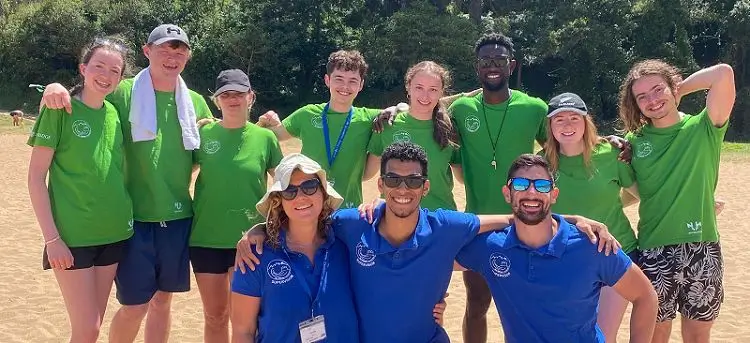When parents think about sending their children to an English camp, the first thing that usually comes to mind is language improvement. However, what many discover later is that the most valuable lessons are not measured in grammar or vocabulary, but in confidence, friendships, and experiences that accompany children throughout their lives.
An English camp is not just a place to practice the language: it’s a community where children learn to live together, overcome fears, express themselves confidently, and discover their own independence. The multicultural environment and the close guidance of monitors turn every challenge into an opportunity to grow—not only as students, but also as individuals.
In this article, we’ll explore the main emotional and social benefits that an English camp offers and how these experiences become the best driving force for children and teenagers to learn the language naturally.
Developing self-esteem and confidence
One of the most visible benefits of an English camp is the boost it gives to children’s self-esteem. Stepping out of their routine, living in a new environment, and facing small daily challenges help them discover abilities they didn’t know they had.
Every achievement, no matter how small, strengthens their confidence—from daring to ask for something in English, to joining a match or spending their first night away from home. These experiences show them that they are capable of adapting, communicating, and enjoying themselves in a different setting.
Moreover, improving their English has a direct effect on their self-confidence. Realizing they can express themselves and be understood in another language reinforces their self-esteem and motivates them to keep learning with enthusiasm.
At the Village, this growth is encouraged through close attention from the coaches (with a ratio of 1 monitor per 5 children) and an environment where English is lived naturally at every moment. The combination of personal support and a wide range of activities allows every child to feel supported and gain confidence step by step.
Learning to live together and work as a team
An English camp is not only a place to learn a language; it’s also an experience in coexistence. Children share rooms, meals, games, and projects with peers of different ages and backgrounds, teaching them to respect, collaborate, and adapt to others.
In this environment, teamwork emerges naturally. Whether organizing a football match, preparing a theater performance, or solving a creative challenge, children learn that shared effort is the key to achieving goals. These dynamics strengthen values such as cooperation, empathy, and communication—essential skills for their future lives.
Living together also helps them understand and accept diversity. Interacting with children from other cultures and ways of thinking broadens their minds and gives them tools to navigate an increasingly global world.
At the Village, this experience is enriched by the presence of young people from 12 nationalities and 36 Spanish provinces, turning each day into an opportunity for social and multicultural learning. Team activities, guided by international coaches, strengthen collaboration and ensure that every child finds their place within the group.
Overcoming shyness and expressing themselves confidently
Many parents wonder if their child—especially if shy or slow to socialize—will adapt well to an English camp. Experience shows that this environment is precisely ideal for children to overcome barriers and gain self-assurance.
In a camp, communication in English is not optional but a practical necessity to integrate, play, or take part in activities. Gradually, even the most reserved children discover that they can make themselves understood and that their peers and coaches support them. Every conversation, every small interaction, builds their confidence.
Moreover, creative spaces—such as theater, music, or audiovisual projects—offer environments where children can express themselves without the pressure of a classroom. Rehearsing a script, presenting a group project, or performing a song allows them to experiment with the language in a fun and natural way, losing the fear of making mistakes.
At the Village, programs like the Broadway Academy or the Media Academy are designed to boost that confidence. Through creativity and teamwork, participants learn to express themselves confidently in English while enjoying unique experiences that strengthen their self-esteem.
Making friends from all over the world
One of the greatest gifts an English camp offers is the friendships formed during the experience. Children and teenagers share intense moments—sports, excursions, creative workshops, or simple conversations at mealtime. These experiences create strong bonds that, in many cases, become friendships lasting well beyond the summer.
The most enriching part is that these friendships transcend borders. Living with peers from different countries opens children’s minds and lets them discover new cultures, traditions, and ways of thinking. English becomes the common language that unites everyone, reinforcing their motivation to communicate and learn.
Having friends from different nationalities also fosters curiosity and empathy. Children learn to value diversity and to see the world from broader perspectives—an education as important as learning the language itself.
At the Village, multicultural coexistence is an essential part of the camp. Each edition brings together participants from over 12 nationalities and 36 Spanish provinces, ensuring that every child has the chance to make new friends, discover different cultures, and live an international experience without leaving Spain.
Autonomy and personal responsibility
Spending several days away from home is, for many children, their first major experience of independence. At an English camp, they learn to organize their routines, manage their belongings, follow schedules, and make small decisions on their own. These habits strengthen their sense of responsibility and help them mature.
In a safe and supervised environment, children can experience this independence without risks. Knowing they can manage on their own away from family boosts their self-esteem and gives them a sense of achievement they’ll remember for a long time.
Autonomy also reflects in language learning: children discover that they are the ones who must communicate, ask questions, request help, or take part in activities in English. This active role accelerates their progress and shows them that they can handle another language without depending on adults.
At the Village, this autonomy is encouraged progressively. The Kids (8–12 years) program provides close support and tailored activities so younger campers feel safe while gaining confidence. The Teens (13–17 years) program gives adolescents more independence, with creative and sports challenges that prepare them for more demanding contexts.
How these benefits enhance English learning
The emotional and social benefits of a camp are not separate from the language—in fact, they are the engine that makes children learn English faster and more naturally. When a child gains confidence, feels part of a group, and enjoys what they do, the language flows effortlessly.
- Self-esteem and confidence: by realizing they can communicate in English, children lose their fear of mistakes and dare to speak more.
- Teamwork: collaborating in sports or creative projects requires using the language in a practical and constant way.
- International friendships: the need to communicate with friends from other nationalities makes English the common language of coexistence.
- Personal autonomy: by managing their daily routines, children learn to ask, request, and interact in English in real-life situations.
Thus, language learning doesn’t happen in isolated classes but in every interaction of the day. English becomes associated with positive emotions—fun, friendship, personal achievement—making it a living, useful tool for children.
At the Village, this connection happens naturally through a program combining over 200 hours of English in 15 days, international coaches, sports and creative activities, and multicultural coexistence. All this creates the perfect environment for children to grow not only in English, but also in confidence and maturity.
the Village as an environment to grow in English and in life
An English camp shouldn’t be limited to teaching vocabulary or grammar. The true experience is the one that transforms children and teenagers, making them more confident, independent, and open to the world around them. That’s what happens when a camp combines learning, coexistence, and personal growth in a safe and enriching environment.
At the Village, every detail is designed to enhance both English learning and children’s emotional and social growth. Over 200 hours of English in 15 days, 80% international coaches, coexistence with 12 nationalities, premium facilities, and programs tailored for Kids and Teens make every child’s experience unique.
The result goes far beyond language: participants return home with greater self-confidence, friendships that cross borders, and memories that become lifelong lessons.
An English camp is much more than a summer of games and vocabulary practice. It’s a space where children discover who they are, find their voice, and learn that they can face new challenges with confidence and enthusiasm.
The friendships formed, the confidence gained, and the independence developed are memories and skills that last much longer than a vacation. They are experiences that mark a before and after in every child’s life.
At the Village, we know it well: learning English is only the beginning. What’s truly valuable is seeing each participant return home more confident, more motivated, and with a smile that reflects everything they’ve lived.




